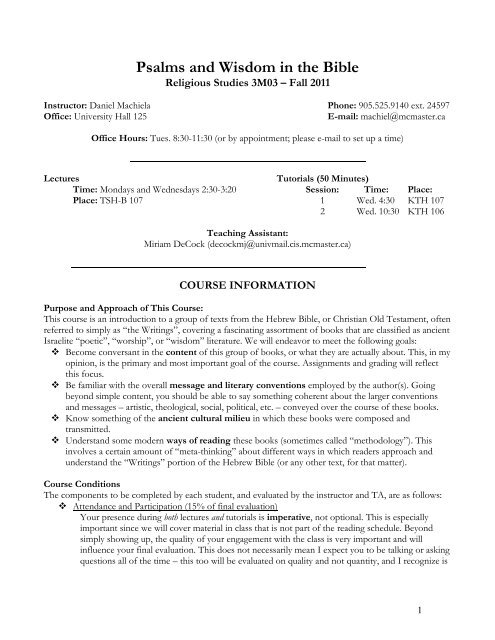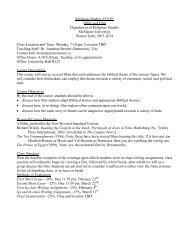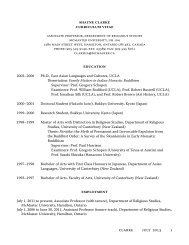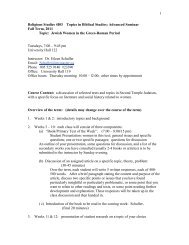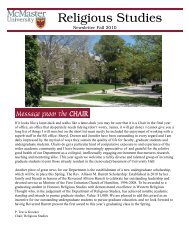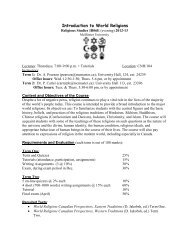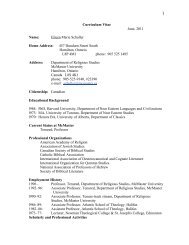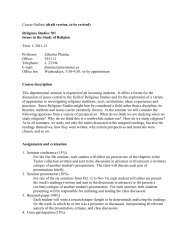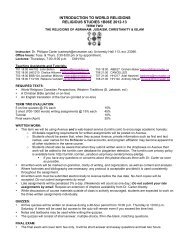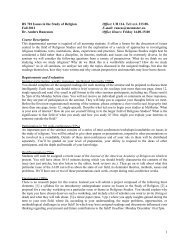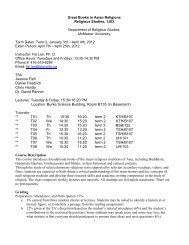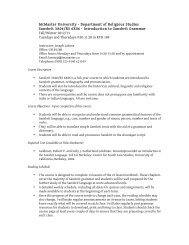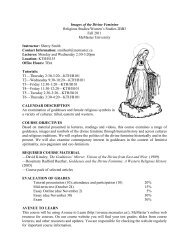3M03 final.pdf - Department of Religious Studies - McMaster University
3M03 final.pdf - Department of Religious Studies - McMaster University
3M03 final.pdf - Department of Religious Studies - McMaster University
You also want an ePaper? Increase the reach of your titles
YUMPU automatically turns print PDFs into web optimized ePapers that Google loves.
Psalms and Wisdom in the Bible<br />
<strong>Religious</strong> <strong>Studies</strong> <strong>3M03</strong> – Fall 2011<br />
Instructor: Daniel Machiela Phone: 905.525.9140 ext. 24597<br />
Office: <strong>University</strong> Hall 125<br />
E-mail: machiel@mcmaster.ca<br />
Office Hours: Tues. 8:30-11:30 (or by appointment; please e-mail to set up a time)<br />
Lectures<br />
Tutorials (50 Minutes)<br />
Time: Mondays and Wednesdays 2:30-3:20 Session: Time: Place:<br />
Place: TSH-B 107 1 Wed. 4:30 KTH 107<br />
2 Wed. 10:30 KTH 106<br />
Teaching Assistant:<br />
Miriam DeCock (decockmj@univmail.cis.mcmaster.ca)<br />
COURSE INFORMATION<br />
Purpose and Approach <strong>of</strong> This Course:<br />
This course is an introduction to a group <strong>of</strong> texts from the Hebrew Bible, or Christian Old Testament, <strong>of</strong>ten<br />
referred to simply as “the Writings”, covering a fascinating assortment <strong>of</strong> books that are classified as ancient<br />
Israelite “poetic”, “worship”, or “wisdom” literature. We will endeavor to meet the following goals:<br />
Become conversant in the content <strong>of</strong> this group <strong>of</strong> books, or what they are actually about. This, in my<br />
opinion, is the primary and most important goal <strong>of</strong> the course. Assignments and grading will reflect<br />
this focus.<br />
Be familiar with the overall message and literary conventions employed by the author(s). Going<br />
beyond simple content, you should be able to say something coherent about the larger conventions<br />
and messages – artistic, theological, social, political, etc. – conveyed over the course <strong>of</strong> these books.<br />
Know something <strong>of</strong> the ancient cultural milieu in which these books were composed and<br />
transmitted.<br />
Understand some modern ways <strong>of</strong> reading these books (sometimes called “methodology”). This<br />
involves a certain amount <strong>of</strong> “meta-thinking” about different ways in which readers approach and<br />
understand the “Writings” portion <strong>of</strong> the Hebrew Bible (or any other text, for that matter).<br />
Course Conditions<br />
The components to be completed by each student, and evaluated by the instructor and TA, are as follows:<br />
Attendance and Participation (15% <strong>of</strong> <strong>final</strong> evaluation)<br />
Your presence during both lectures and tutorials is imperative, not optional. This is especially<br />
important since we will cover material in class that is not part <strong>of</strong> the reading schedule. Beyond<br />
simply showing up, the quality <strong>of</strong> your engagement with the class is very important and will<br />
influence your <strong>final</strong> evaluation. This does not necessarily mean I expect you to be talking or asking<br />
questions all <strong>of</strong> the time – this too will be evaluated on quality and not quantity, and I recognize is<br />
1
simply more comfortable for some than others – but to be alert, prepared, engaged and ready to<br />
enter discussion when it is warranted.<br />
Quizzes (30%; [2 @ 15% each])<br />
There will be two quizzes during the semester aimed at testing your knowledge <strong>of</strong> the primary and<br />
secondary reading material from the course, as well as central topics <strong>of</strong> discussion in lectures and<br />
tutorials.<br />
Essay or Project (30%)<br />
As part <strong>of</strong> the course you will be required to do one <strong>of</strong> the following two options:<br />
1.) Write an essay 6 pages in length (12 pt. font, double-spaced, 1 inch margins) consisting <strong>of</strong> two<br />
parts. In the first (and probably longer) part, you should write about “wisdom today.” That is,<br />
please give your own sketch <strong>of</strong> what constitutes “wisdom” in either prevailing North American<br />
culture (however you define it, which should be part <strong>of</strong> the discussion), or another<br />
contemporary world culture with which you are conversant or have a special interest (e.g.<br />
South American, Japanese, Amish…). Though it is impossible for this not to be somewhat<br />
subjective, you must do legitimate research on the topic and demonstrate this in your essay.<br />
This should include at least several, creditable outside sources demonstrating and supporting your<br />
point(s). These may include electronic resources (websites, etc.), but must also contain at least<br />
one print source (book, legitimate newspaper, etc.). The more solid the research, the better<br />
your grade.<br />
In the second part <strong>of</strong> the essay I would like you to compare and contrast this sketch with our<br />
study <strong>of</strong> biblical views <strong>of</strong> wisdom. What are the basic similarities and differences between the<br />
two Can we see points <strong>of</strong> agreement or disparity You should aim to demonstrate concisely<br />
your familiarity with the content and themes <strong>of</strong> the literature studied in this course within this<br />
section. Be aware that I will be looking for how you “package” your essay – you will want to<br />
have a clear introduction, coherent progression <strong>of</strong> points and/or arguments supported by your<br />
research, and a concluding summary, tying things together.<br />
2.) Complete an alternative media project based on one <strong>of</strong> the texts that we have read over the<br />
course <strong>of</strong> the semester (e.g. a Psalm, a portion <strong>of</strong> Proverbs, Job…). This could take many<br />
shapes: various forms <strong>of</strong> artwork like multimedia collage (poster), standard artwork, graphic<br />
art, computer art/animation, manga, a musical piece (original to you, <strong>of</strong> course), a short story,<br />
video presentation, sculpture, etc.; anything that you think would express this text best and<br />
would fit your skills and interests. Let me stress that this assignment will not be evaluated<br />
primarily on your technical skill in a given area (e.g. music or art), but on your engagement<br />
with the text <strong>of</strong> your choice – the extent to which it is obvious you have “soaked it in” and put<br />
thought and effort into re-expressing it in your chosen way. It is quite easy to see when<br />
someone has slapped something <strong>of</strong> this sort together in a couple <strong>of</strong> days, or when they have<br />
put a significant amount <strong>of</strong> time, thought, and effort into it. Though I am not opposed to you<br />
“pushing the envelope” in certain ways with regard to this project, I do ask that you respect<br />
the sanctity that many people do ascribe to these texts in your work.<br />
A one to two page description must be handed in with the project, identifying the passage you<br />
are working with, outlining the ways in which your project relates to this subject text, and<br />
noting any elements <strong>of</strong> that text that were challenging (or especially fun) to recreate in your<br />
chosen media.<br />
Final Exam (25%)<br />
The <strong>final</strong> will be split into two sections. In the first, you will be asked questions about the texts we<br />
have immersed ourselves in over the semester. These will be “objective” (fill in the blank, multiple<br />
2
choice, true or false, etc.) or short answer. In the second section, you will write two essay<br />
questions (one to two pages) on topics that I will give you in advance.<br />
Required Texts:<br />
The Harper Collins Study Bible. Fully Revised and Updated (NRSV trans.; Atlanta: Society <strong>of</strong><br />
Biblical Literature, 2006.<br />
Ronald E. Clements, Wisdom for a Changing World (Berkeley, Calif.: BIBAL Press, 1990).<br />
Coursepack, “Psalms and Wisdom in the Hebrew Scriptures,” (available in the Bookstore)<br />
<strong>Department</strong> specific:<br />
Staff in the <strong>of</strong>fice <strong>of</strong> the <strong>Department</strong> <strong>of</strong> <strong>Religious</strong> <strong>Studies</strong> will not date-stamp or receive papers and other assignments.<br />
<strong>University</strong> mandated:<br />
1. Academic Integrity<br />
You are expected to exhibit honesty and use ethical behaviour in all aspects <strong>of</strong> the learning process. Academic<br />
credentials you earn are rooted in principles <strong>of</strong> honesty and academic integrity. Academic dishonesty is to<br />
knowingly act or fail to act in a way that results or could result in unearned academic credit or advantage. This<br />
behaviour can result in serious consequences, e.g. the grade <strong>of</strong> zero on an assignment, loss <strong>of</strong> credit with a<br />
notation on the transcript (notation reads: “Grade <strong>of</strong> F assigned for academic dishonesty”), and/or suspension or<br />
expulsion from the university. It is your responsibility to understand what constitutes academic dishonesty. For<br />
information on the various types <strong>of</strong> academic dishonesty please refer to the Academic Integrity Policy, located at<br />
www.mcmaster.ca/academicintegrity<br />
The following illustrates only three forms <strong>of</strong> academic dishonesty:<br />
1. Plagiarism, e.g. the submission <strong>of</strong> work that is not one’s own or for which other credit has been obtained.<br />
2. Improper collaboration in group work.<br />
3. Copying or using unauthorized aids in tests and examinations.<br />
2. <strong>McMaster</strong> Student Absence Form<br />
There have been changes to the MSAF for September 2011:<br />
The maximum value <strong>of</strong> the missed work for which the MSAF can be used will decrease<br />
from 49% to 29%.<br />
The maximum number <strong>of</strong> uses will be reduced from 2 to 1 per term.<br />
“Personal Reasons” will no longer be a valid reason for using the MSAF.<br />
The e-mail message that goes to students following their submission <strong>of</strong> the MSAF will<br />
better describe the steps that students must take to receive relief for the missed work, and<br />
the timelines for doing so. As <strong>of</strong> September 2011, students will be required to visit their<br />
Faculty/Program Office and complete a Permission to use MSAF form, for the following reasons:<br />
o The request for relief for missed academic work is personal.<br />
o The request for relief for missed academic work is religious.<br />
o A component <strong>of</strong> work they have missed is valued at more than 29%.<br />
o They have already used the MSAF once in the Term. Such students may be asked by their<br />
Faculty/Program Office to provide appropriate supporting documentation. If the student’s<br />
request to use the MSAF is approved, the MSAF link will be made available (on a one-time<br />
basis) to the student. The student and faculty member will continue to receive the same<br />
email correspondence regarding the details <strong>of</strong> the request for relief for missed academic<br />
work.<br />
3. Note on Changes in the Course<br />
The instructor and university reserve the right to modify elements <strong>of</strong> the course during the term. The university<br />
may change the dates and deadlines for any or all courses in extreme circumstances. If either type <strong>of</strong> modification<br />
3
ecomes necessary, reasonable notice and communication with the students will be given with explanation and<br />
the opportunity to comment on changes. It is the responsibility <strong>of</strong> the student to check her/his <strong>McMaster</strong> email<br />
and course websites weekly during the term and to note any changes.<br />
4. Social Sciences Faculty E-mail Communication Policy<br />
Effective September 1, 2010, it is the policy <strong>of</strong> the Faculty <strong>of</strong> Social Sciences that all email communication sent<br />
from students to instructors (including TAs), and from students to staff, must originate from the student’s own<br />
<strong>McMaster</strong> <strong>University</strong> e-mail account. This policy protects confidentiality and confirms the identity <strong>of</strong> the student.<br />
It is the student’s responsibility to ensure that communication is sent to the university from a <strong>McMaster</strong> account.<br />
If an instructor becomes aware that a communication has come from an alternate address, the instructor may not<br />
reply at his or her discretion.<br />
TENTATIVE SCHEDULE<br />
Date<br />
12 Sept.<br />
Monday<br />
14 Sept.<br />
Wednesday<br />
19 Sept.<br />
Monday<br />
21 Sept.<br />
Wednesday<br />
26 Sept.<br />
Monday<br />
28 Sept.<br />
Wednesday<br />
3 Oct.<br />
Monday<br />
5 Oct.<br />
Wednesday<br />
Description/Assignment<br />
Syllabus, Introductions, and the task <strong>of</strong> defining “Wisdom”<br />
Assigned Reading for Next Class:<br />
1 Samuel 12-17, 23:14-25:1; 2 Samuel 1:1-2:11, (chapters) 6-7, 11-12, 22; 1 Kings 1-2<br />
Context I: The Stories <strong>of</strong> David<br />
Assigned Reading for Next Class:<br />
1 Kings 3, 5-6, 8-15; 2 Kings 17, 21, 24-25; 1 Chronicles 23:24-32<br />
Context II: Solomon’s Greatness; the Decline and Exiles <strong>of</strong> Israel and Judah<br />
Assigned Reading for Next Class:<br />
John Ciardi and Miller Williams, “Introduction” and “Chapter One,” in Coursepack<br />
Robert Alter, The Art <strong>of</strong> Biblical Poetry (Basic Books, 1985), 3-26<br />
“Poetics” Inside and Outside <strong>of</strong> the Bible<br />
Assigned Reading for Next Class:<br />
Christopher Alexander, “The Quality without a Name,” in Coursepack<br />
Genesis 1-3, Exodus 25-31 and 35-40 (skim)<br />
Raymond Van Leeuwen, “Cosmos, Temple, House,” in Coursepack.<br />
The Broad Setting <strong>of</strong> “Biblical Wisdom”: the Structure <strong>of</strong> Creation<br />
Assigned Reading for Next Class:<br />
Proverbs 1-9<br />
R. Van Leeuwen, “In Praise <strong>of</strong> Proverbs,” in Coursepack<br />
Introduction to “Proverbs” in the Harper Collins Study Bible (HCSB), 849-51<br />
Proverbs: A Solomonic Compilation <strong>of</strong> Wisdom<br />
Assigned Reading for Next Class:<br />
Proverbs 10-24:34<br />
Clements, Wisdom for a Changing World, 15-35<br />
Proverbs (cont.)<br />
Assigned Reading for Next Class:<br />
Proverbs 24-29<br />
Clements, Wisdom for a Changing World, 37-55<br />
Proverbs (cont.)<br />
Assigned Reading for Next Class:<br />
Proverbs 30-31<br />
4
Clements, Wisdom for a Changing World, 57-77<br />
A. Wolters, “Nature and Grace in the Interpretation <strong>of</strong> Proverbs 31:10-31,” in Coursepack<br />
10 Oct.<br />
Monday<br />
12 Oct.<br />
Wednesday<br />
17 Oct.<br />
Monday<br />
19 Oct.<br />
Wednesday<br />
24 Oct.<br />
Monday<br />
26 Oct.<br />
Wednesday<br />
31 Oct.<br />
Monday<br />
2 Nov.<br />
Wednesday<br />
7 Nov.<br />
Monday<br />
9 Nov.<br />
Wednesday<br />
**QUIZ 1**<br />
Proverbs (cont.)<br />
Assigned Reading for Next Class:<br />
Psalms 1-2, 5, 36, 91, 129<br />
C. Westermann, “Introduction: Theology <strong>of</strong> the Psalms,” in Coursepack<br />
Two Paths: The Program and Canonical Setting <strong>of</strong> the Book <strong>of</strong> Psalms<br />
Assigned Reading for Next Class:<br />
Psalms 32, 33, 34, 37, 49, 111, 112<br />
Introduction to “the Psalms” in HCSB, 732-35<br />
“Wisdom” Psalms: Internalizing Biblical Wisdom<br />
Assigned Reading for Next Class:<br />
Psalms 48, 87, 132, 137<br />
The City and House <strong>of</strong> God in the Psalms<br />
Assigned Reading for Next Class:<br />
Psalms 8, 19, 119:1-32 and 57-97, 136, 148<br />
Creation, Torah, and the Resplendent Revelation <strong>of</strong> God<br />
Assigned Reading for Next Class:<br />
Psalms 15, 24, 37, 112, 128 and 30, 51, 116, 128, 139<br />
The Psalms on Human Conduct/The Individual and the Lord <strong>of</strong> Israel<br />
Assigned Reading for Next Class:<br />
Psalms 82, 93, 76, 110 and 94, 39, 40, 42, 44<br />
King and Judge <strong>of</strong> Heaven and the Earth/An Unjust God<br />
Assigned Reading for Next Class:<br />
Jeremiah 7<br />
2 Kings 24-25 (review)<br />
Lamentations<br />
Introduction to “Lamentations” in HCSB, 1085-86<br />
Lamentations<br />
Assigned Reading for Next Class:<br />
Job 1-10<br />
Introduction to “Job” in HCSB, 692-93<br />
C. Newsom, “The Book <strong>of</strong> Job as Polyphonic Text,” in The Book <strong>of</strong> Job (Oxford: Oxford <strong>University</strong> Press,<br />
2003), 1-31<br />
Righteous Job and His Test<br />
Assigned Reading for Next Class:<br />
Job 11-28<br />
Newsom, continued<br />
[Perhaps we will also read “Like the Book <strong>of</strong> Job,” at<br />
http://www.christianitytoday.com/ct/movies/interviews/2009/johnhillcoat-nov09.html<br />
**QUIZ 2**<br />
Job and His “Friends”: The Discussion Continues<br />
Assigned Reading for Next Class:<br />
Job 29-42<br />
Read: http://www.nobelprize.org/nobel_prizes/peace/laureates/1986/wiesel-lecture.html<br />
5
14 Nov.<br />
Monday<br />
16 Nov.<br />
Wednesday<br />
21 Nov.<br />
Monday<br />
23 Nov.<br />
Wednesday<br />
28 Nov.<br />
Monday<br />
30 Nov.<br />
Wednesday<br />
Job Gets an Answer (sort <strong>of</strong>)<br />
Assigned Reading for Next Class:<br />
Ecclesiastes (Qohelet)<br />
Introduction to “Ecclesiastes” in HCSB, 890-92<br />
C. Bartholomew, “Qohelet in the Canon Current Trends in the Interpretation <strong>of</strong> Ecclesiastes,” Themelios 24:3<br />
(1999): 4-20<br />
Available online at: http://www.biblicalstudies.org.uk/<strong>pdf</strong>/qoheleth_bartholomew.<strong>pdf</strong><br />
**PAPERS OR PROJECTS DUE**<br />
Ecclesiastes (Qohelet)<br />
Assigned Reading for Next Class:<br />
Esther<br />
Introduction to “Esther” in HCSB, 680-81<br />
After reading the Hebrew version please read Additions A, C, D, and F <strong>of</strong> the Greek (I will explain further in<br />
class…)<br />
Esther<br />
Assigned Reading for Next Class:<br />
Song <strong>of</strong> Songs/Song <strong>of</strong> Solomon<br />
Introduction to “The Song <strong>of</strong> Solomon” in HCSB, 903<br />
A. J. Heschel, “Duties <strong>of</strong> the Heart,” Heavenly Torah, 189-207<br />
Song <strong>of</strong> Songs<br />
Assigned Reading for Next Class:<br />
Selections from either A. Astell, The Song <strong>of</strong> Songs in the Middle Ages or E. Ann Matter, The Voice <strong>of</strong> My Beloved<br />
on Medieval Interpretation <strong>of</strong> the Song <strong>of</strong> Songs<br />
Finishing Song <strong>of</strong> Songs and Looking Back over the Course<br />
6


